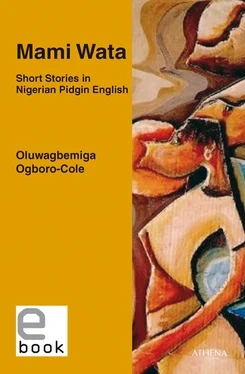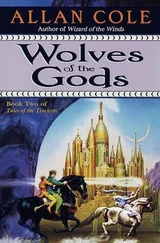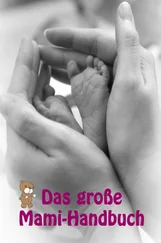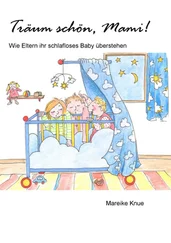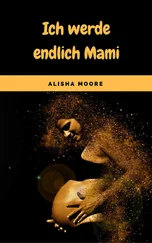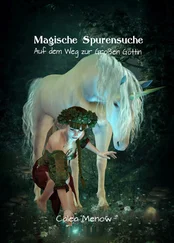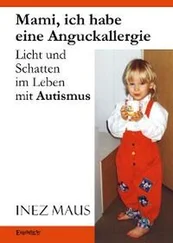Oluwagbemiga Ogboro-Cole
Mami Wata
Short Stories in Nigerian Pidgin English
ATHENA
Literaturen und Kulturen Afrikas
Band 7
Bibliografische Information der Deutschen Nationalbibliothek
Die Deutsche Nationalbibliothek verzeichnet diese Publikation
in der Deutschen Nationalbibliografie; detaillierte bibliografische Daten
sind im Internet über abrufbar.
E-Book-Ausgabe 2015
Copyright der Printausgabe © 2009 by ATHENA-Verlag,
Copyright der E-Book-Ausgabe © 2015 by ATHENA-Verlag,
Mellinghofer Straße 126, 46047 Oberhausen
www.athena-verlag.de
Alle Rechte vorbehalten
Datenkonvertierung E-Book: le-tex publishing services GmbH, Leipzig
ISBN (Print) 978-3-89896-354-1
ISBN (ePUB) 978-3-89896-865-2
Dedicated to my late mother, Ejide Ogboro-Cole, who made stories out of my world, to my daughter, Anna-Sophie, to my goddaughter, Marie Luise Krings, to my wonderful wife, Tinatin. Above all, I give praise to God for his blessings and for his guidance in all my endeavors.
I am grateful to Dr. Wolfgang Bender, my supervisor, for his assistance.
I cannot thank Professor Helen Chukwuma, scholar and the first female professor at the University of Port Harcourt, Nigeria, for her support in the choice of language for research.
The motherly advice and assistance from Professor Omibiyi Obi dike (Humboldt Fellow), University of Ibadan, Nigeria, in the course of my studies were most profound. I cannot thank her enough.
It is in the same vein that I recall the helpful faith teachings in God by Bishop and Dr. Renea Johnson (Victory Community Church, Arizona, USA.). I thank them for their prayers, friendship and parental advise.
My gratitude goes to Benjamin Bandowe, research fellow at the Geographic Institute, Johannes Gutenberg University of Mainz, Germany, for proofreading my work.
I would like to acknowledge the African Literature Association (ALA, USA), the African Studies Association (ASA, USA), for the promotional efforts towards making African writers realize their dreams as well as their services in my work a reality.
I also gratefully acknowledge all my friends and anybody who may have added to the success of this book.
During the colonial era in Nigeria, both the missionaries and the elite considered Nigerian Pidgin English as a means of communication with a subversive undertone. The language was described as part of the ongoing passive resistance to colonial rule. There was a lot of prejudice against the language. The language was, in fact, classified ›Broken English‹. the term stuck to it. Surprisingly, today, the language has gained acceptance among students, professors, the mass media, the entertainment industry, government agencies and the religious sector. People from these fields believe they had in earlier times been deprived the use of this language.
The Federal Republic of Nigeria comprises 36 states and the Federal Capital Territory. Several languages are spoken in the country by its numerous ethnic groups. There arose, therefore, a need for a common medium of communication among the diverse ethnic groups. Apparently, this would facilitate understanding, tolerance, peaceful coexistence and harmony among the various peoples. Pidgin serves this purpose of a language of contact. The popularity Pidgin English enjoys presently can be attributed to the awareness given to it by the youth. Although Pidgin English is believed to be the most logical choice as a lingua franca, it has received little recognition from the people responsible for language policy in Nigeria. Today, modern linguistics has contributed to a reversal in attitude towards Pidgin English. The Language is now recognized by scholars all over the world.
The folktales in Mami Wata are written in Nigerian Pidgin English. Mami Wata literarily means Mother of Rivers. In Yoruba folktales, it refers to the Mermaid, who is an iconic figure symbolizing the goddess of the sea. This goddess has magical powers. With these powers, she can provide every person’s needs. Till this day, the Mami Wata is worshiped by her followers as a deity. In some quarters, the Mami Wata is called ›Yemoja‹ (mother of the fish) or ›Yeye Olokun‹ (mother of the Atlantic Ocean), while some other people call her ›Yeye Osun‹ (mother of the Osun River). Osun River is located in Osogbo, Osun State, in the western part of Nigeria. Osun River is interwoven with the history of the Yoruba people. It represents the creation of the city life of Ile Ife and the adventures of past Yoruba warriors. These warriors are highly respected and deified by the Yorubas and have been immortalized. Yoruba folktales frequently use animal imagery, characters, skin patterns, forms, their pace and weaknesses etc. to create visual images and as forms of expression. Among the Yorubas, parents use speech forms derived from Yoruba folktales (many of them involve animal characters) to communicate with their children and vice versa. This is because everyone, in spite of his or her educational or social status, can relate to these folktales. For example, the tortoise is used as a moral figure to teach a child the difference between right and wrong. The stories in Mamy Wata are based on childhood stories my mother told me in Yoruba. It is hope that the book would also contribute its part in making society have a more positive attitude towards Pidgin English, a reversal of the trend in colonial times.
Pidgin English dem don say »di language no get head« dat na so di book pipul for Nigeria and di Christian oyinbo pipul wey come for our land Naija long long time ago.
Wetin come dey surprise me now for Naija today, mani mani pipul come see say our language Pidgin English dey veri veri important naim mak pipul like, Proffessor, Musican, Religion pipul, and our gofument too come see am too.
For our country Nigeria wey bi say language plenty well well wit 36 state and Abuja our head for all di state wey we get for Naija, wey show say we dey speak like almost 250 langauges.
All dis language no even bring we naijas together for di sake of say we no fit to talk to each other with one language and di tin be say e no help we. And instead mak di tin help na divid e dey divid us. Our book pipul and gofument dem don try make we for get another language. Dem try sote come try di language we dem call WAZOBIA.
Di problem bi say di onli language wey we all dey talk take understand each other dem come band am, say di tin no bi language say Pidgin English no get head say dem no go take am as language for our land Naija.
Di tin wey make me write dis book for Pidgin English na for di same reason we bi di down look wey dem dey take see anibodi wey talk for Pidgin English wey dem no wan take as language for Naija.
»Mami Wata« na stori book wey I write for Naija Pidgin English, wey bi popular language, wey mani mani pipul dey talk for Naija.
Naija Pidgin English dey different from all di 250 languages wey we dey talk for Naija, di reason wey Pidgin come bi di language wey pipul dey talk today na because of our young children dem wey come see say Pidgin English no dey bad at all as dem take teach dem for school. Dem tell us wen we dey like pikin say Pidgin English no bi good language say na bad language wey person wey go school mus not speak.
Our children dem don see Pidgin language as wonderful language, naim come make dem dey use am for dem music today wey dem dey call rap or hiphop.
Pidgin hiphop don nearly over take all di music wey dey for naija today, but we no fit talk about di reason wey Naija Pidgin English come popurlar today make we no tank di pipul wey start dey use use am.
Читать дальше
